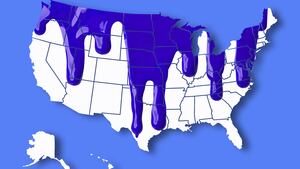When states started the all-important process of drawing the next decade’s congressional districts last year, Democratic officials were caught on the horns of a dilemma: Should they take the moral high road, or the road to a House majority?
There was no question about what Republicans would do. They’ve made no secret of their decades-long effort to draw the most lopsided maps wherever they had the power to do so.
But Democrats, having spent the last decade trying to end the practice known as gerrymandering, entered this round of redistricting squeamish about the idea they might propagate it themselves.
“I just don’t believe we justify our bad behavior based on theirs,” Rep. Dan Kildee (D-MI) told The Daily Beast in October.
Months later, it’s clear what path Democrats chose; the maps don’t lie. In New York, they wiped three Republican seats off the map with a stroke of Gov. Kathy Hochul’s pen. In Illinois, Democrats eliminated two GOP seats, dissecting the state into a burst of ribbons extending from the Chicago area.
Whatever squeamishness Democrats had, they apparently got over it. On Wednesday, Kildee told The Daily Beast that the GOP’s “continuing to use their power to tilt the scales” was Democrats’ main concern.
“We obviously have legislation that would change that,” Kildee said. “Until then, we’re gonna fight fire with fire.”
That firefight has gone better than Democrats could ever have imagined. With the redistricting process coming to a close nationwide, Democrats are expected to at least break even with Republicans—maybe even come out slightly ahead.
That would represent one of the few bright spots for Democrats, heading into a challenging 2022 election season. And it would be a significant and unexpected win for a party that expected to start their fight for the majority having already effectively lost it due to the GOP’s structural advantages in map-drawing.

Rep. Dan Kildee (D-MI) speaks during a news conference on July 24, 2020 in Washington, DC.
(Photo by Michael A. McCoy/Getty)Eric Holder, the former Obama administration Attorney General, now heads up the National Democratic Redistricting Committee. In a press call on Thursday, Holder said Republicans are all but certain not to repeat the redistricting romp they pulled off last time.
“We are denying them that outcome,” Holder said. “They will not succeed as they did 10 years ago.”
Part of that story is the success of Democrats’ state-level efforts to reform gerrymandering. A number of key states, like Michigan, have created independent commissions that draw maps, taking the power away from parties and leading to fairer maps.
Beyond that, some especially aggressive GOP gerrymanders have been struck down by courts this year, preserving Democratic seats. Last week, for example, North Carolina’s highest state court sided with a challenge to a Republican-drawn map that gave Democrats less than a quarter of the seats in that evenly split state.
As much as any other factor, though, the eagerness of Democrats to go for the jugular in states like New York and Illinois helped to foreclose the redistricting bloodbath they feared.
It’s an uncomfortable reality for Democrats to acknowledge. On Thursday, Holder told reporters it was “inaccurate” to say the two parties are doing the same thing. He contended that Democrats used census data to inform their maps in New York, even though independent experts have called that map a “master class” in gerrymandering.
Pressed later on his contention, Holder made a small concession. “I might have done the map a little differently,” he said.
But many Democrats wouldn’t have.
Asked if Democrats in his home state were justified in drawing their map, Sen. Dick Durbin (D-IL), chair of the Senate Judiciary Committee, started his answer with “under these circumstances,” and reiterated his support for reforms.
“I’m ready to vote for any approach that treats all states the same,” Durbin said. “I think if we have passion for reform in just the blue states, we’re foolish.”
Others are losing little sleep over Democrats’ aggressive map-drawing, even as Republicans attack them for hypocrisy on the issue.
“What would cause a greater crisis, frankly, is to allow just this completely uninhibited Republican gerrymandering… and there be no response,” Rep. Alexandria Ocasio-Cortez (D-N.Y.) told The Daily Beast. “I think that would actually be a much worse situation.”
Plenty of Democrats are uneasy about what’s happening, but they increasingly believe that GOP gerrymandering efforts in the states—as well as the right’s near-unified opposition to election reforms in Washington—make their own moves acceptable.
“I can’t say that I’m excited about gerrymandering, whether it’s done by Democrats or Republicans,” said Rep. Colin Allred (D-TX), who was a voting rights attorney before being elected in 2018. “Gerrymandering is corrosive on multiple levels— it reduces turnout, it makes people feel like the game is rigged, I think it increases skepticism and cynicism about our democracy.”
But, Allred added, the goal “in this case is to try and preserve our democracy against some forces that I think are very literally trying to take it in a different direction.”
Although GOP gerrymanders have been stifled on several fronts, they have still found plenty of success, eliminating Democratic or competitive seats in a number of states, including Oklahoma, Tennessee, Utah, Georgia, South Carolina, and Kansas. Pending maps in Florida, Ohio, and Wisconsin could further eat into Democrats’ advantage.

Rep. Colin Allred, D-Texas, shakes hands as he arrives for the early voting rally for Joe Biden at a polling location for the Texas primary in Dallas on Saturday, Feb. 22, 2020.
(Photo By Bill Clark/Getty Images)Republicans have had huge wins in court, too. On Monday, the U.S. Supreme Court reinstated Alabama’s map, which a lower court had previously ruled was an unconstitutional weakening of Black voters’ power.
And, of course, there is the fact that GOP gerrymandering gains have already been blunted by their previous success. In states like Ohio, Texas, and North Carolina—where Trump won by eight points, six points, and one point, respectively—the seat breakdowns between the parties have been lopsided in the GOP’s favor. They had 12 of Ohio’s 16 seats, 26 of Texas’ 39 seats, and eight of North Carolina’s 13 seats.
But right now, the clearest outcome of this round of redistricting was a drastic reduction in the number of competitive seats nationwide. When voters go to the polls later this year, only 40 out of 435 U.S. House districts will be considered competitive, according to The New York Times, the lowest level in decades.
Lawmakers and experts worry that will only supercharge a continued trend of stark partisanship in Congress, though academic studies have found that the effect of gerrymandering on political polarization can be overstated.
However, in safely red or blue districts, primary voters have the definitive say in who they send to Washington. On the GOP side, primaries in recent years have largely become contests over which candidate is most loyal to Donald Trump.
Allred, for one, predicted “there’ll be fewer candidates who are having to appeal to a broader spectrum of the electorate.”
“So I’m worried that will mean that you’ll have more entrenched positions from both parties and again, the incentive structure will be concerned with their primary and the general election,” Allred said. “That’s something I’ve always been worried about with gerrymandering.”
What that outcome means for what Democrats say they want—putting an end to gerrymandering through comprehensive federal reforms—is less clear.
A GOP-run U.S. House is guaranteed to not advance those reforms, so Democrats have a very blunt rationale for their own aggressive mapmaking on that front. Meanwhile, Senate Republicans do not seem inspired by Democratic gerrymandering to embrace reforms themselves. A few key GOP senators simply shrugged, preferring to leave the issue to the states or the courts, reported NBC News.
An increasingly gerrymandered Congress may be loath to pass reforms—therefore legislating the majority of its members into tough elections and, inevitably, defeat.
Michael Li, senior counsel at the Brennan Center for Justice, a think tank and democracy advocacy group, told The Daily Beast that “both parties’ caucuses are about to get more polarized.”
The effect of that polarization, and the general weariness of the redistricting arms race, could prompt parties to reconsider solutions, Li theorized. “Having drawn blood on both sides, maybe tempers can cool and you can do something?” he said.
Until then, Democrats agree: The current process is helping to sap the already abysmal levels of public trust in government, and there’s basically nothing they can do about it for a long time, so long as Republicans oppose reforms and some Democrats oppose changing Senate rules to pass reforms without them.
“I hope what people see around the country is recognizing that the current system doesn’t work,” said Rep. Andy Kim (D-N.J.). “The hope is that, 10 years from now, we don’t have to have such a ridiculous process.”










